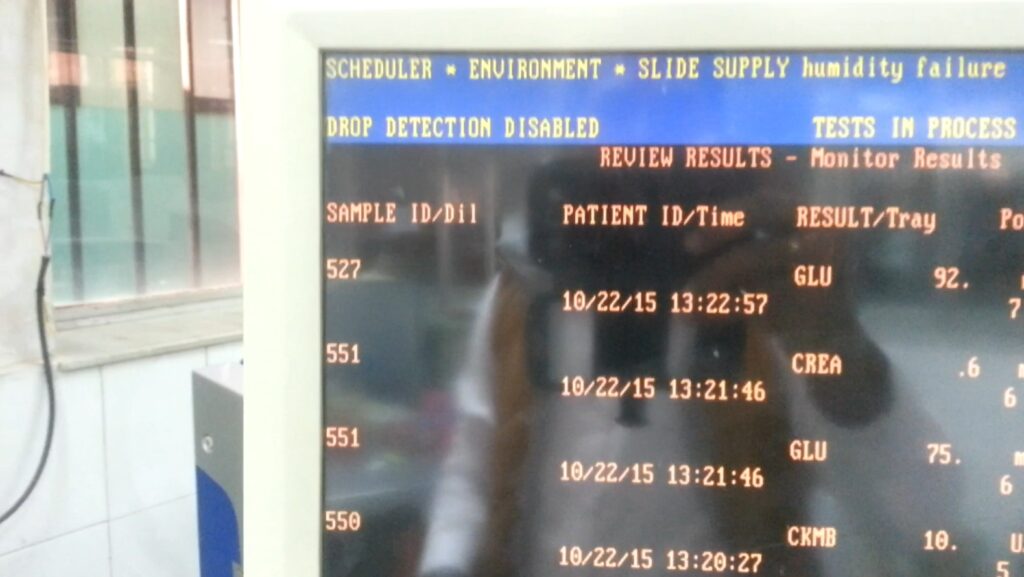Biochemistry Test: Introduction, List of Tests, Unit and Normal Range
Biochemistry is the branch of medicine that deals with a series of blood tests used to evaluate the functional ability of several critical organs and systems of the body. e.g. renal function test (RFT) for kidney, liver function test (LFT) for liver, Cardiac profile test for the heart, thyroid function test for thyroid disorders, Calcium, phosphorus, Alkaline phosphatase, and uric acid for bones and joints, similarly for nutrition status protein, albumin, globulin, albumin, and globulin ratio are tested, while arterial blood gas analysis (ABG) is mainly applied to monitor carbon dioxide and oxygen levels related to pulmonary (lung) function but is also used to measure blood pH and bicarbonate levels for certain metabolic conditions, glucose tolerance test (GTT) involves repeated testing to determine the rate at which glucose is processed by the body.
 Biochemistry tests results on the screen of Vitrous 250 analyser" width="1024" height="577" />
Biochemistry tests results on the screen of Vitrous 250 analyser" width="1024" height="577" />
List of Tests
Glucose Test
- Fasting
- Post Prandial (PP)- 2 hours
- Random
- Oral Glucose Tolerance Test (OGTT)-75gm/100gm
- Glucose Challenge Test (GCT)-50 gm
Renal Function test
- Urea
- Serum Creatinine
- Sodium (Na+)
- Potassium (K+)
Other tests
- Total calcium
- Serum inoragnic Calcium (iCa+)
- Uric Acid
- Glycated Haemoglobin (HbA1C)
Liver Function test
- Total Bilirubin
- Direct Bilirubin
- Alkaline Phosphate
- Serum Glutamic-Oxaloacetic Transaminase (SGOT) or Aspartate Aminotransferase(AST)
- Serum Glutamic-Pyruvic Transaminase (SGPT) or Alanine Aminotransferase(ALT)
- Total Protein
- Albumin
Lipid Profile
- Total Cholesterol
- High-Density Lipoprotein (HDL)
- low-density lipoproteins (LDL)
- Triglyceride
Serum Lipase
Serum Amylase
Adenosine Deaminase (ADA ) Test for (serum/CSF/Fluid)
Unit and Normal Range
Recent Comments
- Michaeldab on Methylene Blue Stain: Introduction, Principle, Composition, Preparation, Staining Requirements, Staining Procedure, Result Interpretation, and Keynotes
- Michaeldab on HLA-B27 Test: Introduction, Result-Interpretation, Clinical Significance, and Keynotes
- Michaeldab on Biochemical Test of Gram-Negative Bacteria: Introduction, Common Tests, List of Organisms, Keynotes, and Some Related Footages
- Michaeldab on Human Papillomavirus (HPV) Genes detection using Real-Time PCR: Introduction, Principle, Test Requirements, Procedure, Result Interpretation and Keynotes
- Michaeldab on Gene Sequencing: Introduction, and Frequently Asked Questions (FAQs)

 Biochemistry tests results on the screen of Vitrous 250 analyser" width="1024" height="577" />
Biochemistry tests results on the screen of Vitrous 250 analyser" width="1024" height="577" /> Biochemistry tests results on the screen of Vitrous 250 analyser" width="1024" height="577" />
Biochemistry tests results on the screen of Vitrous 250 analyser" width="1024" height="577" />